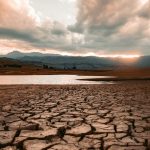 February 11, 2020 11:39 am
Published by Climate Extremes
February 11, 2020 11:39 am
Published by Climate Extremes
CLEX researchers found that regions where there is a larger drying trend tend to be more sensitive to land water availability and have more heatwave days. They found that the effect of dry soils before a heatwave varies considerably across Australia.
 December 7, 2019 1:00 am
Published by Climate Extremes
December 7, 2019 1:00 am
Published by Climate Extremes
CLEX Director Andy Pitman highlights the importance of our research at a challenging time in southern and eastern Australia as a combination of drought, fire and hot weather confront communities, and as air quality in some cities reaches dangerous levels.
 September 20, 2019 3:06 pm
Published by Climate Extremes
September 20, 2019 3:06 pm
Published by Climate Extremes
In an hour-long talk to a business forum, Andy Pitman said: “there is no link between climate change and drought”. Given the audience were not climate scientists, or interested in the physics of the climate, this statement was one word too brief. Andy fully admits he should have said: “there is no direct link between climate change and drought”.
August 27, 2019 12:34 pm
Published by Climate Extremes
Speakers: Andy Pitman (CLEX), Lisa Alexander (CLEX), Greg Holland (Climate and Energy College), Seth Westra (University of Adelaide), Ryan Crompton (Risk Frontiers)
 August 2, 2019 11:34 am
Published by Climate Extremes
August 2, 2019 11:34 am
Published by Climate Extremes
This release is to advise the community that an ACCESS Oversight Committee has been formed initially comprising Christian Jakob, Rachel Law, Helen Cleugh, Andy Pitman, Tony Hirst, Peter May, David Karoly and Ben Evans. Terms of reference have been agreed to by the group and can be found at the end of this document.
 August 1, 2019 1:00 am
Published by Climate Extremes
August 1, 2019 1:00 am
Published by Climate Extremes
The Centre has had a busy four months with its researchers having an impact nationally and internationally. The Centre has achieved some foundation and enabling research around the delivery of data, and a series of new research discoveries, that will play an important role in climate extremes research for some years. And Centre researchers are once again the winners of some major awards.
 July 19, 2019 6:00 am
Published by Climate Extremes
July 19, 2019 6:00 am
Published by Climate Extremes
This student project will focus on spatially correlated events in Australia that occurred in the past 30 to 40 years. Using observations over this time period the student will catalogue past compound events; assess possible trends in their occurrence; check for preferred spatial correlation patterns; and assess if these were accurately reproduced in reanalysis products (e.g. BARRA, ERA-5 and/or ERA-Interim).
 July 11, 2019 2:32 pm
Published by Climate Extremes
July 11, 2019 2:32 pm
Published by Climate Extremes
The Postdoctoral Research Associate will work on a new ARC-funded project exploring how vulnerable Australia’s eucalypts are to future droughts. This project will combine data-synthesis, experimental manipulation and modelling to deliver new process-orientated insight into the response of eucalyptus trees to projected changes in the frequency, magnitude and duration of future droughts across Australia.
June 24, 2019 11:21 am
Published by Climate Extremes
Speakers: Andy Pitman (CLEX), Lisa Alexander (CLEX), Greg Holland (Climate and Energy College), Seth Westra (University of Adelaide), Ryan Crompton (Risk Frontiers)
 May 24, 2019 1:25 pm
Published by Climate Extremes
May 24, 2019 1:25 pm
Published by Climate Extremes
New CLEX research finds land cover misclassifications over South East Asia based on remote sensing products have negligible impact on the outcomes of climate model experiments. However, land cover experiments that incorporate uncertainties must use large numbers of simulations to get robust results for rainfall and air temperature.







